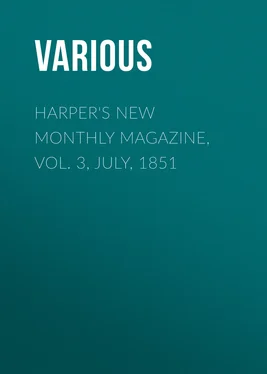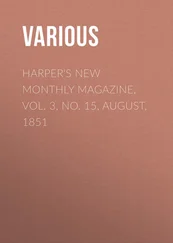Various - Harper's New Monthly Magazine, Vol. 3, July, 1851
Здесь есть возможность читать онлайн «Various - Harper's New Monthly Magazine, Vol. 3, July, 1851» — ознакомительный отрывок электронной книги совершенно бесплатно, а после прочтения отрывка купить полную версию. В некоторых случаях можно слушать аудио, скачать через торрент в формате fb2 и присутствует краткое содержание. Издательство: Иностранный паблик, Жанр: foreign_antique, periodic, foreign_edu, на английском языке. Описание произведения, (предисловие) а так же отзывы посетителей доступны на портале библиотеки ЛибКат.
- Название:Harper's New Monthly Magazine, Vol. 3, July, 1851
- Автор:
- Издательство:Иностранный паблик
- Жанр:
- Год:неизвестен
- ISBN:нет данных
- Рейтинг книги:3 / 5. Голосов: 1
-
Избранное:Добавить в избранное
- Отзывы:
-
Ваша оценка:
- 60
- 1
- 2
- 3
- 4
- 5
Harper's New Monthly Magazine, Vol. 3, July, 1851: краткое содержание, описание и аннотация
Предлагаем к чтению аннотацию, описание, краткое содержание или предисловие (зависит от того, что написал сам автор книги «Harper's New Monthly Magazine, Vol. 3, July, 1851»). Если вы не нашли необходимую информацию о книге — напишите в комментариях, мы постараемся отыскать её.
Harper's New Monthly Magazine, Vol. 3, July, 1851 — читать онлайн ознакомительный отрывок
Ниже представлен текст книги, разбитый по страницам. Система сохранения места последней прочитанной страницы, позволяет с удобством читать онлайн бесплатно книгу «Harper's New Monthly Magazine, Vol. 3, July, 1851», без необходимости каждый раз заново искать на чём Вы остановились. Поставьте закладку, и сможете в любой момент перейти на страницу, на которой закончили чтение.
Интервал:
Закладка:
"Hold, hold," I sayd, "I dare not listen to this … you are wrong, you know you are wrong."
"How and where," he sayth; "onlie tell me. I long to be put righte."
"Our images are but symbols of our saints," I made answer; "tis onlie y eignorant and unlearned that worship y emere wood and stone."
"But why worship saints at alle?" persisted Will; "where's the warrant for it?"
I sayd, "Heaven has warranted it by sundrie and speciall miracles at divers times and places. I may say to you, Will, as Socrates to Agathon, 'You may easilie argue agaynst me, but you cannot argue agaynst the truth.'"
"Oh, put me not off with Plato," he impatientlie replyed, "refer me but to holie writ."
"How can I," quoth I, "when you have ta'en away my Testament ere I had half gone through it? 'Tis this book, I fear me, poor Will, hath unsettled thee. Our church, indeed, sayth the unlearned wrest it to theire destruction."
"And yet the apostle sayth," rejoyned Will, "that it contayns alle things necessarie to our salvation."
"Doubtlesse it doth, if we knew but where to find them," I replied.
"And how find, unlesse we seeke?" he pursued, "and how know which road to take, when we find the scripture and the church at issue?"
"Get some wiser head to advise us," I rejoyned.
"But an' if the obstacle remains the same?"
"I cannot suppose that," I somewhat impatientlie returned, "God's word and God's church must agree; 'tis only we that make them at issue."
"Ah, Meg, that is just such an answer as Father Francis mighte give—it solves noe difficultie. If, to alle human reason, they pull opposite ways, by which shall we abide? I know; I am certain. ' Tu, Domine Jesu, es justitia mea! '"
He looked soe rapt, with claspt hands and upraysed eyes, as that I coulde not but look on him and hear him with solemnitie. At length I sayd, "If you know and are certayn, you have noe longer anie doubts for me to lay, and with your will, we will holde this discourse noe longer, for however moving and however considerable its subject matter may be, it approaches forbidden ground too nearlie for me to feel it safe, and I question whether it savoureth not of heresie. However, Will, I most heartilie pitie you, and will pray for you."
"Do, Meg, do," he replyed, "and say nought to anie one of this matter."
"Indeede I shall not, for I think 'twoulde bring you if not me into trouble, but, since thou hast soughte my counsel, Will, receive it now and take it...."
He sayth, "What is it?"
"To read less, pray more, fast, and use such discipline as our church recommends, and I question not this temptation will depart. Make a fayr triall."
And soe, away from him, though he woulde fain have sayd more, and I have kept mine owne worde of praying for him full earnestlie, for it pitieth me to see him in such case.
Poor Will, I never see him look grave now, nor heare him sighe, without thinking I know the cause of his secret discontentation. He hath, I believe, followed my council to y eletter, for though y emen's quarter of y ehouse is soe far aparte from ours, it hath come rounde to me through Barbara, who hath it from her brother, that Mr. Roper hath of late lien on y eground, and used a knotted cord. As 'tis one of y eacts of mercy to relieve others, when we can, from satanic doubts and inquietations, I have been at some payns to make an abstracte of such passages from y efathers, and such narratives of noted and undeniable miracles as cannot, I think, but carry conviction with them, and I hope they may minister to his soul's comfort.
Tuesday.
Supped with my Lord Sands. Mother played mumchance with my lady, but father, who saith he woulde rather feast a hundred poor men than eat at one rich man's table, came not in till late, on plea of businesse. My lord tolde him the king had visitted him not long agone, and was soe well content with his manor as to wish it were his owne, for the singular fine ayr and pleasant growth of wood. In fine, wound up y eevening with musick. My lady hath a pair of fine toned clavichords, and a mandoline that stands five feet high; the largest in England, except that of the Lady Mary Dudley. The sound, indeed, is powerfull, but methinketh the instrument ungaynlie for a woman. Lord Sands sang us a new ballad, "The King's Hunt's up," which father affected hugelie. I lacked spiritt to sue my lord for y ewords, he being soe free-spoken as alwaies to dash me; howbeit, I mind they ran somewhat thus....
"The hunt is up, the hunt is up,
And it is well-nigh daye.
Harry our King has gone hunting
To bring his deere to baye.
The east is bright with morning lighte,
And darkness it is fled,
And the merrie horn wakes up y emorn
To leave his idle bed.
Beholde y eskies with golden dyes,
Are …"
—The rest hath escaped me, albeit I know there was some burden of hey-tantera, where my lord did stamp and snap his fingers. He is a merry heart.
Now that Gunnel is gone, I take to heart that I profited not more by his teaching. Saying to Mercy, overnight, that methought she missed not our good master, she made answer, "Oh yes, I doe; how can I choose but miss him, who taught me to be, to doe, and to suffer?" And this with a light laugh, yet she lookt not merrie.
… Writing y eabove, I was interrupted by shrill cries either of woman or boy, as of one in acute payn, and ran forthe of my chamber to learne y ecause. I met Bess coming hastilie out of y egarden, looking somewhat pale, and cried, "What is it?" She made answer, "Father is having Dick Halliwell beaten for some evill communication with Jack. 'Tis seldom or never he proceedeth to such extremities, soe the offence must needs have beene something pernicious; and, e'en as 'tis, father is standing by to see he is not smitten over-much; ne'erthelesse, Giles lays the stripes on with a will."
It turned me sick. I have somewhat of my mother in me, who was a tender and delicate woman, that woulde weepe to see a bird killed by a cat. I hate corporall punishments, and yet they've Scripture warrant. Father seldom hath recourse to 'em; and yet we feare as well as love him more than we doe mother, who, when she firste came among us, afore father had softened her down a little, used to hit righte and left. I mind me of her saying one day to her own daughter Daisy, "Your tucker is too low," and giving her a slap, mighte have beene hearde in Chelsea Reach. And there was the stamp of a greate red hand on Daisy's white shoulder all y eforenoon, but the worst of it was, that Daisy tooke it with perfect immoveabilitie, nor lookt in the leaste ashamed, which Scripture sayth a daughter shoulde doe, if her parent but spit in her face, i.e. sett on her some publick mark of contumely. Soe far from this, I even noted a silent look of scorn, which payned me, for of all the denunciations in Holy Writ, there is none more awfull to my mind than that which sayth, "The eye that mocketh at father or mother," not alone the tongue, but e'en the eye,—"the young ravens of the valley shall pick it out."
Конец ознакомительного фрагмента.
Текст предоставлен ООО «ЛитРес».
Прочитайте эту книгу целиком, на ЛитРес.
Безопасно оплатить книгу можно банковской картой Visa, MasterCard, Maestro, со счета мобильного телефона, с платежного терминала, в салоне МТС или Связной, через PayPal, WebMoney, Яндекс.Деньги, QIWI Кошелек, бонусными картами или другим удобным Вам способом.
Читать дальшеИнтервал:
Закладка:
Похожие книги на «Harper's New Monthly Magazine, Vol. 3, July, 1851»
Представляем Вашему вниманию похожие книги на «Harper's New Monthly Magazine, Vol. 3, July, 1851» списком для выбора. Мы отобрали схожую по названию и смыслу литературу в надежде предоставить читателям больше вариантов отыскать новые, интересные, ещё непрочитанные произведения.
Обсуждение, отзывы о книге «Harper's New Monthly Magazine, Vol. 3, July, 1851» и просто собственные мнения читателей. Оставьте ваши комментарии, напишите, что Вы думаете о произведении, его смысле или главных героях. Укажите что конкретно понравилось, а что нет, и почему Вы так считаете.












